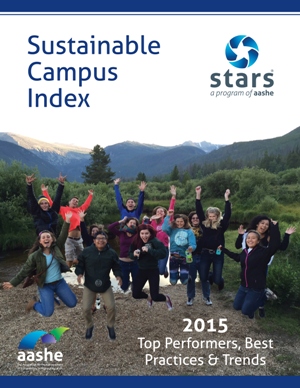by Brianna Crandall — October 26, 2015—The Association for the Advancement of Sustainability in Higher Education (AASHE) has released its 2015 Sustainable Campus Index highlighting top-performing colleges and universities in 17 areas, as measured by AASHE’s Sustainability Tracking, Assessment & Rating System (STARS). AASHE also made announcements concerning Campus Sustainability Month and a COP21 Open Letter.
The 2015 Sustainable Campus Index highlights best practices from over 50 U.S., Canadian and Mexican institutions that have submitted a STARS report in the last 12 months. Average scores in each impact area based on institution type and country are included.
Institutions that achieved the top spot in each impact area are listed below:
- Purchasing: Arizona State University
- Air and Climate: Colby College
- Public Engagement, Waste, Wellbeing and Work: Colorado State University
- Transportation: Columbia University
- Curriculum: Green Mountain College
- Water: Pennsylvania State University
- Diversity and Affordability: Stanford University
- Dining and Food: Sterling College
- Energy, Investment: Unity College
- Buildings: University of Illinois, Urbana Champaign
Multiple institutions tied for first in the areas of Campus Engagement, Coordination and Planning, Grounds, and Research. The full list of top performers in each impact area is provided in the 2015 Sustainable Campus Index report.
In related developments, AASHE announced the annual international Campus Sustainability Month in October. During this month, colleges and universities organize events to engage and inspire incoming students and other campus stakeholders to become sustainability change agents. Events include teach-ins, sustainability pledge-drives, zero energy concerts, waste audits, green sporting events, letter writing campaigns, service projects and more.
AASHE also announced that an Open Letter was handed over ahead of the COP21United Nations Climate Change Conference that will take place in Paris in December, on behalf of The Higher Education Sustainability Initiative (HESI), a global alliance of networks and associations representing more than 6000 universities and colleges on every continent.
The Open Letter urges governments to acknowledge and strengthen the research and education role that universities and colleges play in finding solutions to climate change mitigation and adaptation, in the context of addressing wider issues of sustainability. It proposes specific measures to be implemented such as showcasing campuses as living laboratories for climate change mitigation and using campuses to accelerate the transition to clean energy sources.





